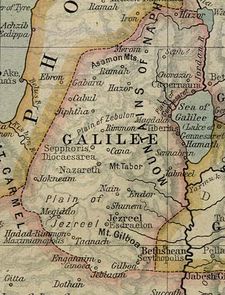Judah haNasi
- For the Amora sage of the 1st generation, see Judah II (Nesi'ah I).
- For the Amora sage of the 4th generation, see Judah III (Nesi'ah II).
- For the Amora sage of the 6th generation, see Judah IV (Nesi'ah III).

Rabbi Yehuda haNasi, (or Judah I; Hebrew: יהודה הנשיא, pronounced Yehuda haNasi, lit. "Judah the Prince"), also known as Rebbi and Rabbeinu HaKadosh (Hebrew: רבינו הקדוש, "Our Holy Rabbi"), was a key leader of the Jewish community of Judea toward the end of the 2nd century CE, during the occupation by the Roman Empire. He is best known as the chief redactor and editor of the Mishnah. He was of the Davidic line, the royal line of King David, hence the title nasi, meaning prince[1]. The title nasi was also used for presidents of the Sanhedrin.[2] (In modern Hebrew, it usually means "President").
Rabbi Judah haNasi died on 15 Kislev in 188CE or 219CE.
Contents |
Biography

Judah haNasi was born in 135. According to the Midrash, he came into the world on the same day that Rabbi Akiva died a martyr's death.[3] The Talmud suggests that this was a result of Divine Providence: God had granted the Jewish people another leader of great stature to succeed Rabbi Akiva. His place of birth is unknown; nor is it recorded where his father, Shimon ben Gamliel II, sought refuge with his family during the persecutions under Hadrian.
On the restoration of order in the Land of Israel, Usha became the seat of the academy and Judah spent his youth there. His father presumably gave him the same education that he himself had received, including Greek language.[4] This knowledge of Greek enabled him to become the Jews' intermediary with the Roman authorities. He favored Greek as the language of the country over Syriac (Aramaic).[5] It is said that in Judah's house, only Hebrew was spoken, and even the maids spoke it.[6]
According to the Talmud (Avodah Zarah 10a-b), Judah haNasi was very wealthy and greatly revered in Rome. He had a close friendship with "Antoninus", possibly the Emperor Antoninus Pius,[7] who would consult Judah on various worldly and spiritual matters.
The Talmud records the tradition that Judah haNasi was buried in the necropolis of Beit She'arim, in the Lower Galilee.[8]
Compiler of the Mishna
| Rabbinical Eras |
|---|
According to Jewish tradition, God gave both the Written Law (Torah) and the Oral Law (additional laws and customs meant to be passed down from teacher to student) to Moses on Mount Sinai. For centuries, only the Torah appeared as a written text. Fearing that the oral traditions might be forgotten, Judah HaNasi undertook the mission of compiling them in what became known as the Mishna. The Mishna consists of 63 tractates codifying Jewish law, which are the basis of the Talmud.
Talmudic legends
Various stories are told about Judah haNasi to illustrate different aspects of his character. One of them begins by telling of a calf breaking free from being led to slaughter. According to the story, the calf tries to hide under Judah haNasi's robes, bellowing with terror, but he pushes the animal away, saying: "Go — for this purpose you were created." For this, Heaven inflicted upon him kidney stones, painful flatulence, and other gastric problems, saying, "Since he showed no pity, let us bring suffering upon him".
The story remarks that when Judah haNasi prayed for relief, the prayers were ignored, just as he had ignored the pleas of the calf. Later he prevented his maid from violently expelling baby weasels from his house, on the basis that "It is written: 'His Mercy is upon all his works.'" For this, Heaven removed the gastric problems from him, saying, "Since he has shown compassion, let us be compassionate with him".
Rabbi Judah HaNasi also said, "One who is ignorant of the Torah should not eat meat." This is because one who is ignorant is on the same level as animals. What, therefore, gives him the right to partake of them as food? Perhaps the punishment he received for lacking compassion towards the calf helped him to see that eating animals is not a matter that should be treated lightly.
While teaching Torah, Rabbi Judah would often interrupt the lesson to recite the Shema prayer. He passed his hand over his eyes as he said it. (Berachot 13b).
Before he died, Rabbeinu HaKadosh said: ‘I need my sons!… Let the lamp continue to burn in its usual place; let the table be set in its usual place; let the bed be made in its usual place.” (Kesubbos/Ketubot 103a)
Sefer Chassidim Sec. 1129. (Cf. Kesubbos/Ketubot 103a.) records that after his passing Rabbeinu HaKadosh used to visit his home, wearing Shabbos (Shabat) clothes, every Friday evening at dusk. He would recite Kiddush, and others would thereby discharge their obligation to hear Kiddush. One Friday night there was a knock at the door. "Sorry," said the maid, "I can't let you in just now because Rabbeinu HaKadosh is in the middle of Kiddush." From then on Rabbeinu HaKadosh stopped coming, since he did not want his coming to become public knowledge.
References
- ↑ Talmud Yerushalmi, quoted in Tosafos, Sanhedrin 5a.
- ↑ Mishna Chagiga 2:2.
- ↑ Midrash Genesis Rabbah 53; Midrash Eccl. Rabbah 1:10.
- ↑ Sotah 49b.
- ↑ Sotah 49b.
- ↑ Megillah 18a; Rosh Hashana 26b; Naz. 3a; 'Er. 53a.
- ↑ A. Mischcon, Abodah Zara, p.10a Soncino, 1988. Mischcon cites various sources, "SJ Rappaport... is of the opinion that our Antoninus is Antoninus Pius." Other opinions cited suggest "Antoninus" was Caracalla, Lucius Verus or Alexander Severus.
- ↑ Babylonian Talmud (Talmud Bavli), Tractate Bava Metzia 85a, Tractate Pesachim 49b; Jerusalem Talmud, Tractate Kelaim 9, 32a-b.
| Preceded by Shimon ben Gamliel II |
Nasi 165 (Est.) - 220 |
Succeeded by Gamaliel III |
|
|||||||||||||||||||||||||||||||||||||||||||||||||||||||||||||||||||||||||||||||||||||||||||||||||||||||||||||||||||||||||||||||||||||||||||||||||||||||||||||||||||||||||||||||||||||||||||||||||||||||||||||||||||||||||||||||||||||||||||||||||||||||||||||||||||||||||||||||||||||||||||||||||||||||||||||||||||||||||||||||||||||||||||||||||||||||||||||||||||||||||||||||||||||||||||||||||||||||||||||||||||||||||||||||||||||||||||||||||||||||||||||||||||||||||||||||||||||||||||||||||||||||||||||||||||||||||||||||||||||||||||||||||||||||||||||||||||||||||||||||||||||||||||||||||||||||||||||||||||||||||||||||||||||||||||||||||||||||||||||||||||||||||||||||||||||||||||||||||||||||||||||||||||||||||||||||||||||||||
|---|---|---|---|---|---|---|---|---|---|---|---|---|---|---|---|---|---|---|---|---|---|---|---|---|---|---|---|---|---|---|---|---|---|---|---|---|---|---|---|---|---|---|---|---|---|---|---|---|---|---|---|---|---|---|---|---|---|---|---|---|---|---|---|---|---|---|---|---|---|---|---|---|---|---|---|---|---|---|---|---|---|---|---|---|---|---|---|---|---|---|---|---|---|---|---|---|---|---|---|---|---|---|---|---|---|---|---|---|---|---|---|---|---|---|---|---|---|---|---|---|---|---|---|---|---|---|---|---|---|---|---|---|---|---|---|---|---|---|---|---|---|---|---|---|---|---|---|---|---|---|---|---|---|---|---|---|---|---|---|---|---|---|---|---|---|---|---|---|---|---|---|---|---|---|---|---|---|---|---|---|---|---|---|---|---|---|---|---|---|---|---|---|---|---|---|---|---|---|---|---|---|---|---|---|---|---|---|---|---|---|---|---|---|---|---|---|---|---|---|---|---|---|---|---|---|---|---|---|---|---|---|---|---|---|---|---|---|---|---|---|---|---|---|---|---|---|---|---|---|---|---|---|---|---|---|---|---|---|---|---|---|---|---|---|---|---|---|---|---|---|---|---|---|---|---|---|---|---|---|---|---|---|---|---|---|---|---|---|---|---|---|---|---|---|---|---|---|---|---|---|---|---|---|---|---|---|---|---|---|---|---|---|---|---|---|---|---|---|---|---|---|---|---|---|---|---|---|---|---|---|---|---|---|---|---|---|---|---|---|---|---|---|---|---|---|---|---|---|---|---|---|---|---|---|---|---|---|---|---|---|---|---|---|---|---|---|---|---|---|---|---|---|---|---|---|---|---|---|---|---|---|---|---|---|---|---|---|---|---|---|---|---|---|---|---|---|---|---|---|---|---|---|---|---|---|---|---|---|---|---|---|---|---|---|---|---|---|---|---|---|---|---|---|---|---|---|---|---|---|---|---|---|---|---|---|---|---|---|---|---|---|---|---|---|---|---|---|---|---|---|---|---|---|---|---|---|---|---|---|---|---|---|---|---|---|---|---|---|---|---|---|---|---|---|---|---|---|---|---|---|---|---|---|---|---|---|---|---|---|---|---|---|---|---|---|---|---|---|---|---|---|---|---|---|---|---|---|---|---|---|---|---|---|---|---|---|---|---|---|---|---|---|---|---|---|---|---|---|---|---|---|---|---|---|---|---|---|---|---|---|---|---|---|---|---|---|---|---|---|---|---|---|---|---|---|---|---|---|---|---|---|---|---|---|---|---|---|---|---|---|---|---|---|---|---|---|---|---|---|---|---|---|---|---|---|---|---|---|---|---|---|---|---|---|---|---|---|---|---|---|---|---|---|---|---|---|---|---|---|---|---|---|---|---|---|---|---|---|---|---|---|---|---|---|---|---|---|---|---|---|---|---|---|---|---|---|---|---|---|---|---|---|---|---|---|---|---|---|---|---|---|---|---|---|---|---|---|---|---|---|---|---|---|---|---|---|---|---|---|---|---|---|---|---|---|---|---|---|---|---|---|---|---|---|---|---|---|---|---|---|---|---|---|---|---|---|---|---|---|---|---|---|---|---|---|---|---|---|---|---|---|---|---|
|
|||||||||||||||||||||||||||||||||||||||||||||||||||||||||||||||||||||||||||||||||||||||||||||||||||||||||||||||||||||||||||||||||||||||||||||||||||||||||||||||||||||||||||||||||||||||||||||||||||||||||||||||||||||||||||||||||||||||||||||||||||||||||||||||||||||||||||||||||||||||||||||||||||||||||||||||||||||||||||||||||||||||||||||||||||||||||||||||||||||||||||||||||||||||||||||||||||||||||||||||||||||||||||||||||||||||||||||||||||||||||||||||||||||||||||||||||||||||||||||||||||||||||||||||||||||||||||||||||||||||||||||||||||||||||||||||||||||||||||||||||||||||||||||||||||||||||||||||||||||||||||||||||||||||||||||||||||||||||||||||||||||||||||||||||||||||||||||||||||||||||||||||||||||||||||||||||||||||||
See also
|
||||||||||||||||||||